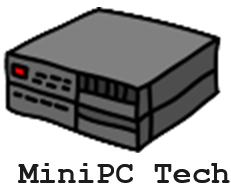Choosing Raspberry Pi for improving coding skills is a game-changer. It offers hands-on learning with real-world projects, enhancing your problem-solving abilities and critical thinking. You don’t need much prior knowledge; the user-friendly interface makes coding accessible for everyone. With abundant resources available, you can start quickly, exploring fun projects that foster creativity. Plus, collaborating on group projects sharpens your teamwork skills, which are essential in today’s job market. Raspberry Pi also opens up career opportunities in various industries. There’s so much more to explore, so keep going to uncover the full potential of this incredible tool!
Key Takeaways
- Raspberry Pi provides hands-on, real-world projects that enhance understanding of coding concepts through practical application.
- Its user-friendly interface and pre-loaded programming languages make it accessible for beginners to start coding immediately.
- Engaging in diverse projects fosters creativity and innovation, allowing learners to explore various programming tasks.
- Collaborative projects and peer programming improve teamwork skills and encourage problem-solving among participants.
- Skills gained from Raspberry Pi projects are highly relevant in the job market, opening doors to numerous career opportunities.
Raspberry Pi for Improving Coding Skills Promotes Critical Thinking
Raspberry Pi undeniably promotes essential thinking among students, providing a dynamic platform for hands-on learning experiences. By engaging with real-world projects, you’ll collect and analyze data from various sensors like temperature and air quality. This approach not only enhances your understanding of STEM concepts but also encourages you to apply theoretical knowledge in practical scenarios.
As you immerse yourself in coding and programming, you’ll nurture essential problem-solving skills. The interactive environment lets you write code and see immediate results, fostering an innovation mindset. You’ll face challenges that require troubleshooting and debugging, which are vital for developing logical reasoning and decision-making skills. Additionally, Raspberry Pi serves as a cost-effective solution for educational technology, making it accessible to students from diverse backgrounds. Moreover, Raspberry Pi models support project-based learning, allowing you to tackle real-world problems collaboratively. Working alongside peers, you’ll exchange ideas and learn from different perspectives, enhancing your creativity. This collaborative spirit expands your network and connects you with like-minded individuals globally, enriching your learning experience.
Ultimately, using Raspberry Pi for coding not only builds your technical skills but also cultivates the essential thinking necessary to navigate the complexities of the modern world.
Makes Learning Fun
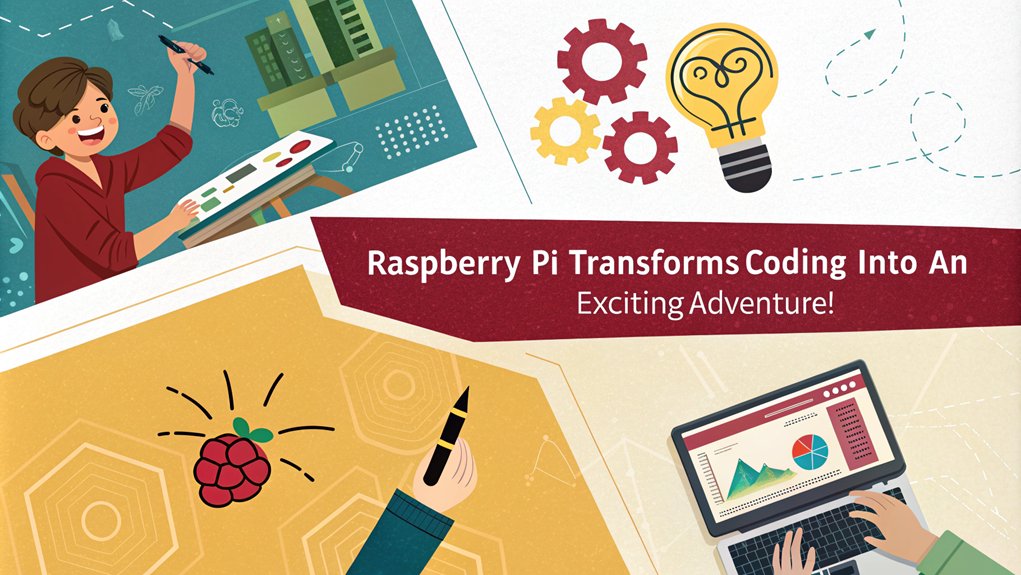
Learning becomes an adventure when you immerse yourself in exciting projects with Raspberry Pi. With its user-friendly interface, you can engage in interactive storytelling and game development using Scratch, where you can create animations, games, and enthralling narratives.
You’ll find the drag-and-drop programming makes it easy to bring your ideas to life, even if you’re just starting out. Imagine building your own retro gaming system to play classic games or developing custom Minecraft mods through the Minecraft API. The versatility of Raspberry Pi models not only enhances your coding skills but also keeps you engaged and motivated. Plus, Raspberry Pi opens doors to hands-on learning, where you can automate tasks with cool home automation projects like music streaming boxes and plant watering systems. Additionally, engaging in projects fosters digital creativity that can lead to innovative solutions in various fields.
As you connect coding to tangible outcomes, you’ll see real-world applications of your skills. The vibrant community surrounding Raspberry Pi offers a wealth of tutorials and resources, ensuring you’re never alone on your journey.
Blends Coding With Math
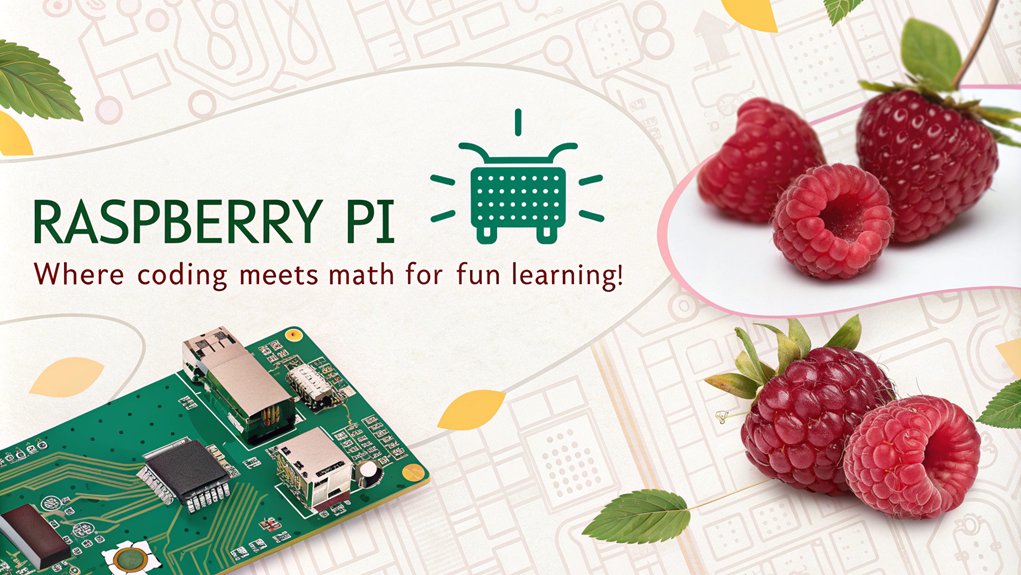
Coding isn’t just about writing lines of text; it’s a gateway to understanding and applying mathematical concepts in a hands-on way. When you immerse yourself in coding with Raspberry Pi, you’re not just learning to program; you’re enhancing your mathematical skills through engaging projects.
Here are a few ways coding blends seamlessly with math:
- Algorithm Development: You’ll create algorithms to solve real-life math problems, like calculating angles using the law of cosines.
- Numerical Solutions: Through coding, you can explore complex mathematical concepts, including numerical integration and matrix calculations in physics. Additionally, using MATLAB Coder, you can translate your algorithms into portable C code for execution on Raspberry Pi. Furthermore, you can develop a math game that generates random arithmetic questions to improve your problem-solving abilities.
- Project Integration: Build math games that adjust difficulty based on your coding input, making learning dynamic and personalized.
- Problem-Solving Skills: Coding fosters critical thinking as you identify problems, design equations, and verify solutions.
Using Raspberry Pi, you gain a unique opportunity to solidify your understanding of math while developing essential coding skills.
With hands-on projects, you engage deeply with both subjects, paving the way for innovative problem-solving and advanced mathematical thinking.
Improves Collaboration Skills
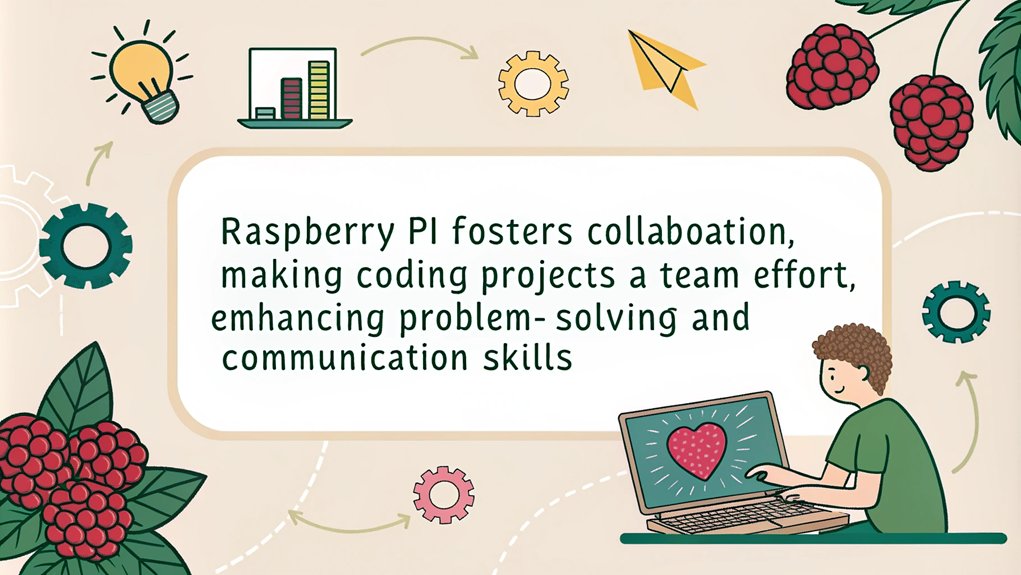
In today’s tech-driven world, collaboration is an essential skill that enhances both coding projects and personal growth. When you engage in Raspberry Pi projects, you’ll discover that peer programming is a powerful approach to improve your teamwork abilities. By working in pairs, you switch between the roles of ‘driver’ and ‘navigator,’ honing your problem-solving skills as you strategize and code together. This rotation not only guarantees active learning but also fosters engagement and enthusiasm for computing.
As you tackle group projects, like building a motion sensor or a music streaming device, you’ll experience firsthand the importance of project synergy. Teaming up with others allows you to blend diverse skills—from coding to electronics—creating a richer learning experience. You’ll enhance your coordination and communication skills, essential elements for effective teamwork. Additionally, collaborating on projects that integrate infrared motion sensors can lead to innovative solutions and a deeper understanding of sensor technology. Furthermore, using a compact, cost-effective tool like Raspberry Pi encourages collaborative problem-solving, making it easier to share ideas and develop solutions together.
Moreover, the Raspberry Pi community encourages peer feedback and mentorship, providing a supportive environment for growth. As you share your insights and reflect on each other’s work, you’ll build confidence and refine your coding abilities.
Expands Career Opportunities

Expanding your career opportunities is one of the most rewarding aspects of mastering Raspberry Pi. As you immerse yourself in this versatile platform, you’ll discover that the skills you gain can greatly boost your career growth in various industries. The low power consumption of Raspberry Pi makes it an attractive solution for many innovative applications.
You’ll not only stay relevant in today’s fast-paced job market but also open doors to specialized roles that require strong coding skills.
Consider the diverse paths you can explore:
- Multiple Industries: Your coding prowess applies to gaming, education, and autonomous driving.
- Specialized Roles: Positions like software engineer and Human-Computer Interaction Research Scientist await your expertise.
- Entrepreneurial Opportunities: Your Raspberry Pi projects could inspire innovative startup ideas in IoT and robotics.
- Global Job Market: Many companies, including Fortune 500 firms, seek professionals with Raspberry Pi experience.
With programming languages like Python and C, system administration, and automation skills in high demand, you’ll stand out to potential employers. Additionally, maintaining a high client rating on platforms like Upwork can significantly enhance your job prospects.
The hands-on experience you gain through Raspberry Pi not only sharpens your technical abilities but also enhances your networking opportunities, reinforcing your industry relevance.
Embrace this journey, and watch your career flourish!
Minimal Prior Knowledge Needed

Getting started with Raspberry Pi is easier than you might think, even if you have no background in electronics or programming. The device is designed with a user-friendly interface, allowing you to focus solely on basic programming without the need for advanced electronic skills. You can dive right into simple projects, like flashing an LED or using a button, without worrying about the technicalities of hardware.
Raspberry Pi operates like any standard Linux computer, so you can concentrate on software and coding right away. It comes pre-loaded with multiple programming languages and text editors, making it simple to start coding immediately. Python and Scratch are particularly beginner-friendly, with Python’s syntax resembling natural English. Additionally, the pre-installed code editors make it even easier to jump straight into coding projects. Hands-on practice with simple components encourages experimentation and builds confidence as you learn.
You’ll find a wealth of resources to guide you through your initial projects. The official Raspberry Pi website offers tutorials, and community forums provide ongoing support for new users.
Whether you’re a young learner or an adult looking for a new challenge, Raspberry Pi empowers you to explore programming in an accessible way, making innovation within reach for everyone.
Encourages Creativity in Projects
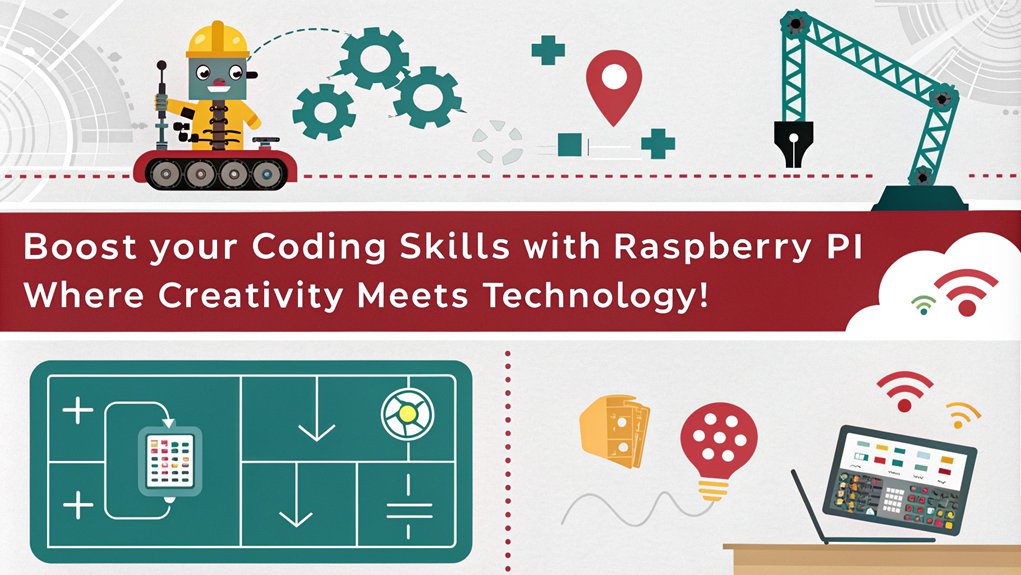
Throughout your journey with Raspberry Pi, you’ll discover how it sparks creativity in a multitude of projects. Its versatility fosters project diversity, allowing you to explore innovative applications that combine coding with real-world problem-solving. With Raspberry Pi, you can transform ideas into tangible creations, pushing the boundaries of your imagination. One of the key advantages of using Raspberry Pi is its ability to act as a desktop computer, making it accessible for various programming tasks. Additionally, the ability to create interactive learning projects further enhances the educational experience, making complex concepts more engaging and accessible.
Here are some exciting project ideas to inspire you:
- Automated Twitter Bot: Create a bot to send automated tweets using Twitter APIs and the Twython library.
- Retro Game Console: Turn the Raspberry Pi into a retro gaming console using RetroPie and a USB controller.
- Time-Lapse Camera: Build a time-lapse camera using a Pi Camera and the Blinkt addon.
- Interactive Toy: Design a DIY toy that can talk, move, or generate noise using magnets and programming.
These projects not only enhance your coding skills but also encourage you to think outside the box. By engaging with diverse projects, you’ll find that each experience adds depth to your creativity, making learning both enjoyable and fulfilling.
Provides Hands-On Experience
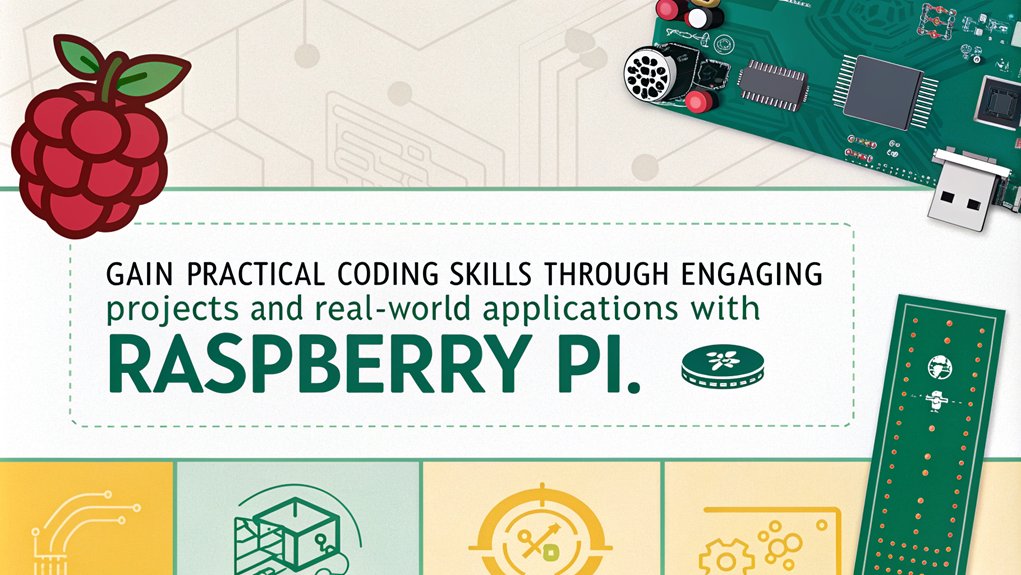
Raspberry Pi offers countless opportunities for hands-on experience, making it an ideal platform for learners of all ages.
You’ll immerse yourself in hardware interaction by setting up and configuring your Raspberry Pi, enabling you to engage in exciting DIY projects like building gadgets, robots, or even small-scale video game systems. This kind of project experimentation fosters a deeper understanding of both electronics and software.
As you work on projects, you’ll enhance your coding skills through practical application. Using block-based interfaces like Scratch or text-based Python, you can create interactive animations, games, and even real-world applications like a solar-powered time-lapse camera. Raspberry Pi Certified Educators have noted the positive impact of this hands-on approach on students’ learning experiences. Additionally, this cost-effective solution allows individual students to access technology without financial strain, encouraging more learners to participate in these enriching activities.
Seeing the immediate results of your code reinforces essential programming concepts like decision-making and looping.
Moreover, Raspberry Pi promotes kinesthetic learning, allowing you to physically build projects and visualize complex coding concepts.
You’ll also benefit from collaborative learning, as many projects require teamwork. By sharing ideas and problem-solving with peers, you’ll develop vital skills that extend beyond coding.
Embrace the hands-on experience Raspberry Pi offers and watch your coding skills flourish in innovative ways!
Frequently Asked Questions
What Age Group Is Best Suited for Raspberry Pi Projects?
When considering age appropriateness for Raspberry Pi projects, younger children benefit from visual learning, while pre-teens and teenagers tackle more complex tasks, enhancing their coding skills and fostering critical thinking through innovative, hands-on experiences.
How Much Does It Cost to Get Started With Raspberry Pi?
To kickstart your Raspberry Pi adventure, expect starter kits to range from $50 to $100, depending on included components. Raspberry Pi pricing varies, but it’s a small investment for endless innovative possibilities.
Can Raspberry Pi Be Used for Advanced Programming Languages?
Yes, Raspberry Pi supports advanced programming languages, letting you tackle coding challenges and enhance software development. Its language compatibility allows you to explore various project complexities, pushing your innovative skills in exciting new directions.
What Types of Projects Can Beginners Create With Raspberry Pi?
You’ll release your inner tech wizard with Raspberry Pi projects! Immerse yourself in beginner-friendly electronics like weather stations or retro gaming consoles, mastering coding fundamentals and creative automation while having a blast building innovative solutions.
Is There a Community or Support Available for Raspberry Pi Learners?
Yes, you’ll find a vibrant community for Raspberry Pi learners through online forums and local meetups. Engaging with others can inspire your projects and provide valuable support as you explore new coding concepts and ideas.
Conclusion
So, if you’re still stuck in the stone age of coding, it’s time to embrace the wonders of Raspberry Pi! Forget the days of dull textbooks and endless lectures—who needs those when you can tinker, create, and collaborate? While your friends are busy binge-watching the latest series, you could be building your own tech marvel. Seriously, why settle for mediocrity when you can release your inner genius? Grab that Raspberry Pi, and let the coding adventure begin!

I am a retired software engineer with experience in a multitude of areas including managing AWS and VMWare development environments. I bought a relative a mini-PC a year ago and have become passionate about the technology and its potential to change how we deploy software.
